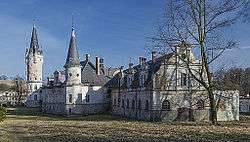Bożków
| Bożków | |
|---|---|
| Village | |
|
Palace in Bożków | |
 Bożków | |
| Coordinates: 50°31′N 16°34′E / 50.517°N 16.567°ECoordinates: 50°31′N 16°34′E / 50.517°N 16.567°E | |
| Country |
|
| Voivodeship | Lower Silesian |
| County | Kłodzko |
| Gmina | Nowa Ruda |
| Population | 1,600 |
Bożków [ˈbɔʂkuf] (German: Eckersdorf) is a village in the administrative district of Gmina Nowa Ruda, within Kłodzko County, Lower Silesian Voivodeship, in south-western Poland.[1] Prior to 1945 it was in Germany.
It lies approximately 9 kilometres (6 mi) south-east of Nowa Ruda, 11 kilometres (7 mi) north-west of Kłodzko, and 76 kilometres (47 mi) south-west of the regional capital Wrocław.
The village has a population of 1,600.
People from Bożków
- Franz Xaver Gebauer (1784—1822), composer, and promoter of 'Concerts spirituels' in Vienna, born when Bożków was called Eckersdorf, in Prussian Silesia from 1742 (Treaty of Breslau) until 1804.
- Heinrich Feisthauer, political opponent of the Nazi-regime and a survivor of Sachsenhausen.
- Franz Magnis-Suseno, Jesuit, rector of the philosophical school in Jakarta, Indonesia.
References
This article is issued from Wikipedia - version of the 11/9/2015. The text is available under the Creative Commons Attribution/Share Alike but additional terms may apply for the media files.
